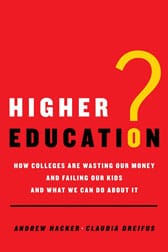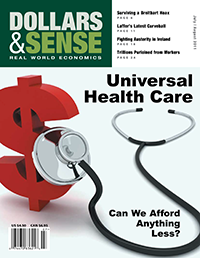Failing to Make the Grade
A review of Higher Education? How Colleges are Wasting our Money and Failing our Kids—And What We Can Do About It by Andrew Hacker & Claudia Dreifus (New York: Time Books, 2010).

Criticizing academia is so very easy. Unfortunately, Higher Education? takes the easy way out and misses a large target at close proximity.
Andrew Hacker is emeritus professor at Queens College; Claudia Dreifus teaches at Columbia University and writes for the New York Times. For their critique of U.S. higher education, they interviewed students and faculty at numerous college campuses, added some data, and made a few dubious computations.

July/August 2011 issue.
Their main complaint is that college is too expensive, especially given what many students get in return. Costs (controlling for inflation) have doubled in a generation; many students graduate deep in debt. Yet undergraduate teaching has been outsourced to part-timers and graduate students. Too many faculty members focus on publication rather than education.
Hacker and Dreifus blame rising college tuition on several factors. First and foremost, they say, faculty are overpaid. (More on this later.) Coming in a close second is administrative bloat. Between 1976 and 2007 the number of administrators per 1,000 students increased from 32 to 63. Over the same time period, administrative salaries have gone through the roof; many university presidents earn over $1 million. Finally, collegiate sports and other amenities (lavish dorm rooms) have to be paid for somehow.
The authors end with examples of colleges that provide good value for the money (i.e., low tuition) as well as some suggestions for reform. They recommend abolishing both tenure and research requirements, so that faculty spend more time teaching and are held accountable for the quality of their teaching.
While high tuition surely does not mean high quality, by the same token low price does not necessarily indicate good value. Similarly, while a sole focus on publishing harms teaching, a focus on just teaching hurts education. Virtue, as Aristotle noted, involves finding a mean between extremes. One recent change for the better at my academic institution has been a demand that faculty do some research. In many cases, the scholarly output has been of meager quality and quantity. But the change enabled us to hire better faculty who are up-to-date professionals.
The big problem with this book, however, is not that it goes to absurd extremes, but that it gets the economics wrong. Faculty pay is not a major cause of rising tuition. Would that it were so! My pay would be nearly double its current rate.
In support of their claim that faculty are overpaid, the authors estimate the hourly pay of Yale professors at $820 by excluding everything but direct teaching hours and office hours because “we have no way of knowing how much time many of them really devote to revising lectures.” This is as nonsensical as computing the hourly pay of cashiers by just counting the time they’re actually ringing up sales, or the hourly pay of politicians by just counting the minutes they spend voting.
Hacker and Dreifus note that, since 1985, full professor salaries at Harvard and Princeton increased by 53% and 64%, respectively, in real terms. The U.S. Department of Education, however, reports the nationwide pay increase for full-time faculty over this time period was less than 20%. Between 1970 and 2007 the inflation-adjusted salary increase of college faculty was close to zero. Such changes cannot cause tuition to double in real terms, especially with average class size increasing dramatically over this time period.
Rising administrative expenses, along with sports and other amenities, are partly responsible for sharply rising tuition. But experts agree the real culprit is the government. Starting in the 1980s, cuts in government support to colleges and universities (to help pay for large tax cuts to the wealthy) have resulted in tuition increases to make up the difference. This story appears nowhere in Higher Education.
Also missing is a discussion of many serious problems plaguing academia—poorly prepared students receiving inadequate academic support, too many students not graduating, hundreds of students in a large lecture hall taught via mind-numbing PowerPoint presentations, and rampant grade inflation.
Overall, Hacker and Dreifus have succumbed to the behavior of many of the college students they interviewed and seek to help: they have not read enough and have failed to do their homework.
